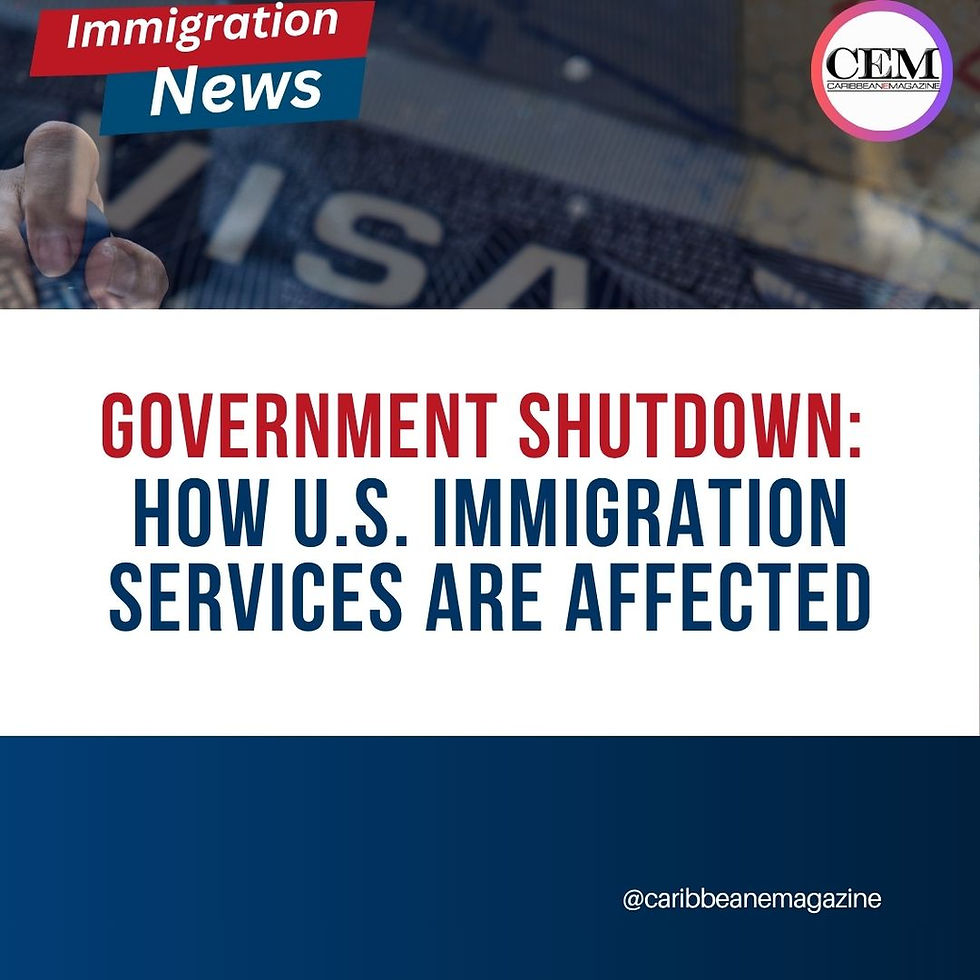Government Shutdown: How U.S. Immigration Services Are Affected
- Oct 1, 2025
- 3 min read
The U.S. federal government officially entered a shutdown today, October 1, 2025. While law enforcement and border security will continue operating, several immigration services are facing suspensions or delays. Understanding which services remain active—and which are halted—is crucial for immigrants, employers, and international travelers navigating this uncertain period.

Immigration Services That Continue During the Shutdown
Despite the shutdown, many critical immigration functions remain active because they are fee-funded or deemed essential:
1. Law Enforcement and Border Security
ICE and CBP operations continue: U.S. Immigration and Customs Enforcement (ICE) and U.S. Customs and Border Protection (CBP) officers are essential personnel. They will continue enforcement, inspections, and removal operations.
Ports of entry remain open: Airports and land borders are operational. Travelers should still expect inspections, though some staffing shortages may cause longer wait times.
2. Detained Immigration Court Cases
Hearings for detained immigrants will proceed. These cases are considered essential and will not be postponed.
3. U.S. Citizenship and Immigration Services (USCIS)
Most services continue: USCIS is fee-funded, so processing of applications and petitions—including green cards, naturalization, and work permits—will largely remain operational.
Biometrics and interviews: Scheduled appointments should continue as planned.
4. Visa and Passport Services
Consular services remain operational since they are also primarily funded by fees. This includes U.S. visa and passport applications.
Possible delays if prolonged: If the shutdown lasts too long, services may slow once reserve funds are depleted.
5. Student and Exchange Visitor Program (SEVP)
ICE will maintain the SEVP system without interruption, meaning foreign students and exchange visitors will not face disruptions.
Immigration Services Suspended or Delayed
The shutdown directly impacts immigration functions funded by congressional appropriations:
1. Non-Detained Immigration Court Cases
Hearings postponed: Immigration court cases for individuals not in detention are suspended until the government reopens.
Case backlog worsens: Already severe delays in the immigration court system will increase.
2. Department of Labor (DOL) Processing
All operations cease: The DOL’s Office of Foreign Labor Certification (OFLC) will not process:
PERM labor certification applications.
Labor Condition Applications (LCAs) for H-1B, H-1B1, and E-3 visas.
Prevailing wage determinations.
FLAG system offline: Employers cannot file or track labor certification applications.
3. E-Verify System
Unavailable during shutdown: Employers must still complete Form I-9 but cannot verify new hires in E-Verify until the system is restored.
Extended deadlines: Tentative Nonconfirmations (TNCs) will have extended resolution deadlines.
4. Special Programs at Risk
Programs funded through appropriations, such as the Conrad 30 Program for foreign physicians and the Special Immigrant Religious Worker Program, may be suspended.
5. Case Inquiries
Delays possible: Congressional offices and the Office of the Citizenship and Immigration Services Ombudsman may be closed or short-staffed, slowing responses to case inquiries.
Who Is Most Affected by the Shutdown?
Non-detained immigrants and asylum seekers: Hearings are delayed, worsening backlogs and prolonging case resolution.
Employers: Companies needing labor certifications or using E-Verify face disruptions in hiring foreign workers.
Foreign workers and visa applicants: Delays in PERM and LCA filings could halt immigration processes.
International travelers: While ports remain open, staffing shortages could cause wait times at airports and land borders.
Visa and passport applicants: Services continue but may slow if the shutdown persists.
Enforcement continues: ICE, CBP, and detained court cases are unaffected.
USCIS remains mostly operational due to fee funding, but expect some delays.
DOL and E-Verify services are suspended, directly impacting employers and foreign workers.
Non-detained immigration cases postponed, worsening the court backlog.
As the October 2025 shutdown unfolds, immigrants, employers, and travelers should monitor official government announcements and check agency websites for updates on case status.








Comments